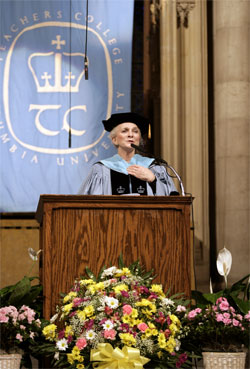The Amazing Grace of Judy Collins
Judy Collins sang last night at graduation. She is an attractive woman of sixty-six who looks younger: medium height, silver hair pulled back, and very much at ease in the hustle and bustle of trustees and faculty putting on their robes in the Chapel of the
During the graduation ceremonies, several honorees spoke about their careers fighting government, the courts and people's attitudes to reestablish the momentum of the civil rights movement, which has lost steam in recent years. They talked about educational inequity; about the gap between rich and the poor; about the ghettos of
When she was introduced to thunderous applause, she stood beside the podium to receive her medal and certificate. The floodlights showered the altar with hot, white light, obscuring the vast congregation on the main floor and in the two balconies above. The church was hushed with expectation. Judy moved behind the podium and thanked Dean Darlyne Bailey and President
What next happened can only be described as magical. With no apparent effort, Judy began to sing "Both Sides Now," filling the entire church with sounds that were crystal-clear after the muffled tones of spoken words of prior speakers. Judy held the entire church in her grasp, easily, gracefully. Where did this glorious sound come from? I could understand the claim that many great singers have made, that they are only instruments through whom God speaks.
The interior of
Earlier, I had asked Judy if any of the songs she is continually asked to perform have become tedious to sing, year after year. She looked at me with her clear eyes and said, "No, I have been fortunate to have chosen great songs, and I never tire of singing them."
After "Both Sides Now," Judy spoke briefly, thanked the audience for their applause, and began to talk about a ballad she had learned from her father when she was a little girl. The song is a famous one, but only recently had she discovered the story behind it. The author was a slave ship owner in the late 1700s, she told us; a captain who nearly died when his ship ran aground. As a result of being spared, he completely changed his life, forsaking the selfish ways he had followed before. The song - "Amazing Grace" -- represents his epiphany.
If "Both Sides Now" evokes memories and a sense of beauty, "Amazing Grace" is pure, liquid emotion. Judy Collins rendered it so beautifully that the entire church was spellbound. As the final notes faded away, there was silence, and then the church erupted in applause, all of us on our feet.
Afterward, Judy received our thanks and congratulations quietly, with no braggadocio, seemingly pleased only that her "speech" had been well received. Yet so much more had occurred. Whether she knew it or not, she had touched a chord inside everyone lucky enough to be a part of Teachers College commencement ceremony.
Published Thursday, Jun. 9, 2005
